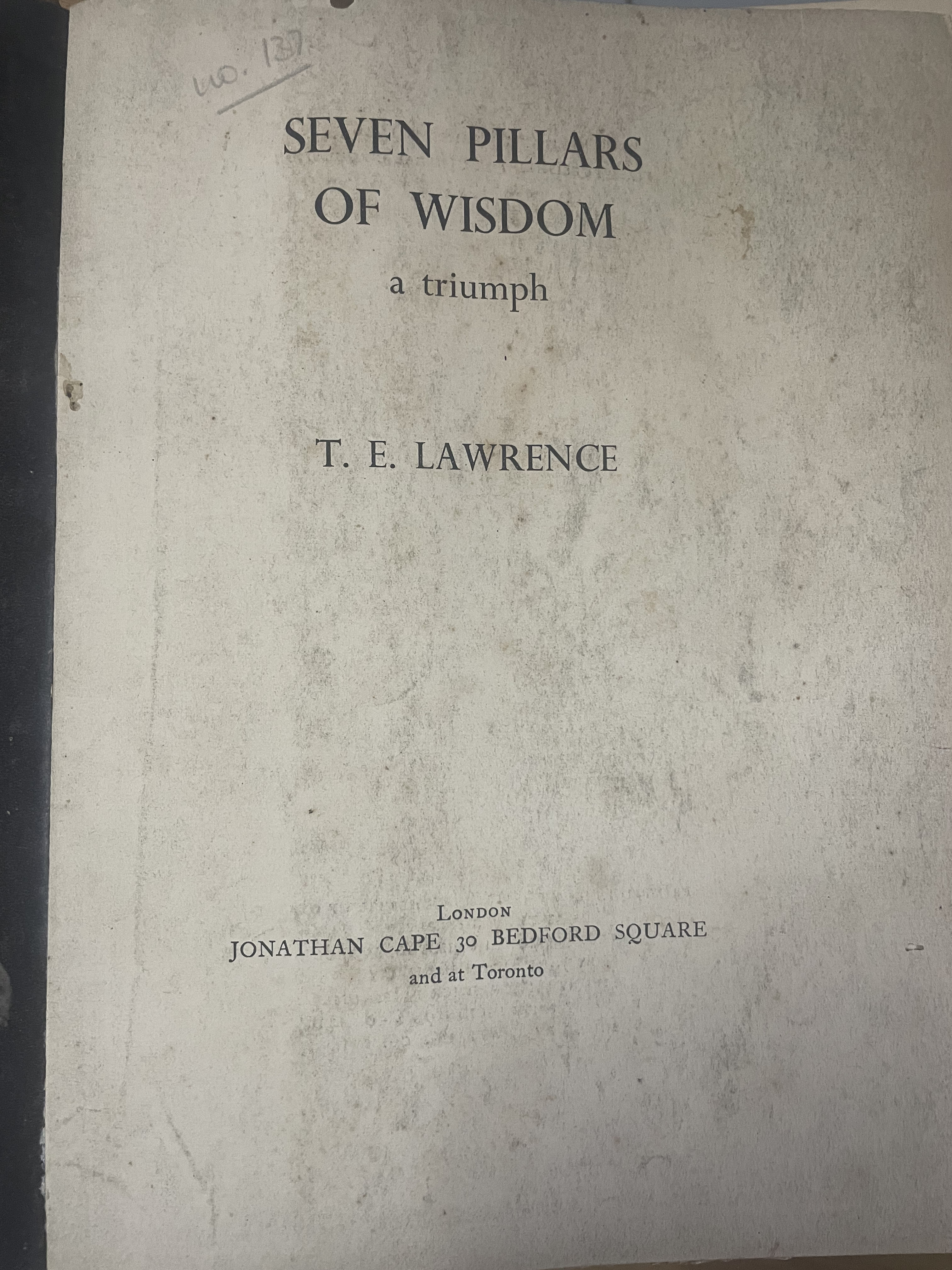Seven Pillars of Wisdom A Triumph

About
Summary
Exquisite
TOC
Details
Related
URL
Images
Overview
Seven Pillars of Wisdom is the autobiographical account of British Army Colonel T.E. Lawrence (Lawrence of Arabia) detailing his experiences during the Arab Revolt against the Ottoman Empire during World War I. Published in 1926, the book is more than a war memoir; it is a profound exploration of identity, politics, and the complexities of warfare.The book recounts Lawrence's time as a liaison officer between the British forces and the Arab resistance. It details the dramatic events, difficult marches, and pronounced violence that marked the quest for Arab independence. Lawrence coordinated a war with Arab commanders and played a role in rallying tribes of nomads to fight as a united nation against the Turkish empire. He instructs rebels to lay charges and detonate explosive gel under train tracks that ferry supplies to Turkish garrisons and towns.
Importance of Book
Historical Account: The book provides a detailed account of the Arab Revolt against the Ottoman Empire during World War I.
Military Strategies: It delves into Lawrence's military strategies and the cultural and political context of the Arab Revolt.
Personal Journey: It is Lawrence's introspective journey of self-discovery. Wrestling with his divided loyalties and ideals, growing to deeply empathize with the people he's leading, all under the severe conditions of desert warfare.
Timeless Insights: The book offers timeless insights into the complexities of Middle Eastern politics and the Western role therein. It's not just a history lesson, but a study in the human experience of conflict, duty, and cultural understanding.
Literary Excellence: Winston Churchill is quoted as saying, "It ranks with the greatest books ever written in the English language. As a narrative of war and adventure it is unsurpassable.
Key Themes
Courage and Sacrifice: Central to Lawrence’s narrative is the bond of loyalty and brotherhood forged between him and his Arab comrades. Despite their disparate backgrounds and cultures, they unite under a common purpose, forming a tight-knit community bound by mutual trust and respect.
Strategy and Ingenuity: As a military strategist, Lawrence demonstrates remarkable ingenuity in his approach to warfare. Faced with superior enemy forces and challenging terrain, he devises innovative tactics to outmaneuver his adversaries and achieve strategic objectives.
Diplomacy and Negotiation: Lawrence's commitment to diplomacy and negotiation as essential tools for conflict resolution is highlighted. He recognizes the importance of dialogue and compromise in achieving sustainable peace and stability in the region.
Resilience and Adaptability: One of the enduring themes of Seven Pillars of Wisdom is the resilience and adaptability of the human spirit in the face of adversity. Lawrence and his comrades confront numerous setbacks and obstacles on their journey, from harsh desert conditions to betrayal and treachery.
Cultural Understanding and Empathy: Central to Lawrence’s approach to the Arab Revolt is his deep respect for Arab culture and his efforts to understand and empathize with its people. Unlike many of his contemporaries, Lawrence rejects colonial attitudes and stereotypes, instead seeking to learn from and collaborate with the Arabs on equal terms.
Legacy and Reflection: Lawrence reflects on the legacy of the Arab Revolt and its broader implications for the future of the Middle East. Despite the eventual betrayal of his Arab allies by the European powers and the failure to realize his vision of Arab independence, Lawrence remains optimistic about the potential for change and renewal in the region.
Cultural Significance
Historical Significance: The book provides a detailed, factual account of Thomas Edward Lawrence’s stint as liaison officer between the British forces and the Arab resistance to the Ottoman Empire during the First World War.
Literary Significance: The book ranks with the greatest books ever written in the English language. As a narrative of war and adventure it is unsurpassable.
Adaptation: The book was adapted into the film Lawrence of Arabia (1962), which won seven Academy Awards including Best Picture in 1963.
Legacy: The book remains a timeless masterpiece that continues to captivate readers with its powerful narrative and profound insights into the human condition.
Effects on Society
Understanding the Arab Revolt: The book increased awareness and understanding of the Arab Revolt.
Middle Eastern Politics: It offers timeless insights into the complexities of Middle Eastern politics and the Western role therein.
Cultural Understanding: It promotes the virtues of cultural understanding and empathy as essential tools for building bridges between diverse communities and fostering mutual respect and cooperation.
Inspiration: The book inspires with its powerful narrative and profound insights into the human condition.
Historical Preservation: The movie was deemed 'culturally, historically or aesthetically significant' by the United States Library of Congress.
Conclusion
Seven Pillars of Wisdom is a complex and significant work that offers a personal account of historical events, explores themes of identity and loyalty, and provides insights into the human condition. It has had a lasting impact on how the Arab Revolt is understood and continues to be relevant in discussions about Middle Eastern politics and cultural understanding. The enduring themes of resilience, cultural understanding, and the complexities of war make it a book that continues to resonate with readers today.
Title
Seven Pillars of Wisdom A Triumph
Author
T E Lawrence
Name of Publisher
Jonathan Cape Bedford Square London
Publish Date
1926
Subject
The Arab Revolt against the Ottoman Empire
Vintage
1901-1947
Number of Pages
670
Category
Biography
Sub Category
Military
Rarity
RARE
